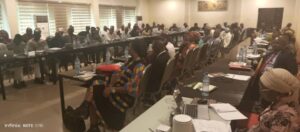Against the backdrop of the country’s Terrorism Financing Risk Assessment (TFRA) 2022 which identified non-profit organizations (NPOs) operating in the North-west to be at risk of terrorism financing, Spaces for Change | S4C organized a two-day capacity-building workshop on countering terrorism financing abuse in the non-profit sector. At the workshop, NPOs operating in the North-West region of Nigeria—comprising Kano, Sokoto, Kebbi, Zamfara, Katsina, Kaduna, and Jigawa State—deepened their understanding of terrorism financing risks in the non-profit sector and the latest regulatory measures for mitigating such risks. The new regulatory measures are contained in the enhanced monitoring regulations for at-risk NPOs issued by the Special Control Unit against Money Laundering (SCUML), an agency within the Economic and Financial Crimes Commission (EFCC). Experts from Spaces for Change, SCUML, and GreenAcre facilitated the workshop held in Kano on September 21 and 22, 2023.
International rules for combating money laundering and the financing of terrorism are formulated by the Financial Action Task Force (FATF). Recommendation 8 (R8) of FATF Standards requires countries to demonstrate their comprehensive understanding of actual terrorism financing (TF) vulnerabilities and threats faced by non-profits and develop proportionate regulatory interventions to mitigate possible risks. In 2021, Nigeria conducted a TF risk assessment of its NPO sector and published the findings the following year. Among other things, the risk assessment found that NPOs operating in the North-West and North-Eastern parts of the country are at risk of terrorism financing due to their proximity to terrorist groups operating in the two regions. Consistent with the FATF’s risk-based approach, the country has developed enhanced regulatory guidelines to protect those NPOs against abuse by terrorists. This proactive approach is necessary because NPOs often rely on public trust to carry out their charitable works. Terrorist groups often seek to exploit this public trust to deceitfully cover up the way they raise or move funds for their terrorist activities.
80% of participants had never heard of FATF or R8 prior to the workshop. During the workshop, S4C shared robust information for understanding the FATF’s R8 as well as the vulnerabilities, threats, and inherent risks in the NPO sector. The major vulnerability is proximity to terrorist groups such as Boko Haram and ISWAP in the North East and North West. The combination of aptitude tests, graphical presentations, and scenario analysis enlightened participants on the importance, methodologies, and findings of the overall TF risk assessment as well as the entire spectrum of NPOs at risk. They also learned about the various typologies of terrorism financing in the NPO sector such as the diversion of funds, affiliation with terrorist entities, abuse of programming, support of terrorist recruitment, and set up of sham NPOs – by terrorist groups.
Consistent with FATF requirements, Nigeria has developed enhanced and targeted measures for dealing with the identified threats of TF abuse applicable to at-risk NPOs. The enhanced monitoring tool requires at-risk NPOs to conduct their individual TF risk assessment, either as a stand-alone assessment or incorporated into their general operating risk assessment. They are also required to develop programmes and policies that insulate their organizations from TF abuse. Other regulatory requirements include regular reporting, record keeping, and due diligence on beneficiaries, donors, vendors, staff, volunteers and partners. Within this context, regulators have a responsibility to ensure that enhanced supervision respects human rights and does not disrupt the legitimate activities of NPOs.
The workshop also covered other related issues such as the new Terrorism (Prevention and Prohibition) Act 2022, which revalidates the delisting of NPOs from the list of obliged entities in Nigeria and attempts a more precise definition of the act of “terrorism”. Participants also learned about FATF’s Recommendation 6 which focuses on targeted financial sanctions and the implications for non-profits. This includes methods for identifying and reporting specific individuals or groups designated under relevant sanction lists, thereby enabling relevant authorities to implement targeted sanctions such as asset freezing and prohibitions to prevent funds or other assets from being made available, directly or indirectly, for the benefit of such individuals, entities, or organizations due to their involvement in terrorism/proliferation financing.
The workshop wrapped up with robust conversations and reflections, which helped to deepen understanding of the new regulations and mechanisms of oversight for at-risk NPOs. Many participants acknowledged they were learning about the TFRA and FATF R8 for the first time, and appreciated the informative presentations that shed light on the compliance obligations espoused under the new regulation. Beyond collaborating with regulatory bodies to conduct outreach to NPOs, S4C will continue its advocacy push for proportionality in the implementation of targeted measures ensuring that they do not either shrink the civic space or result in the overregulation of the NPO sector.




